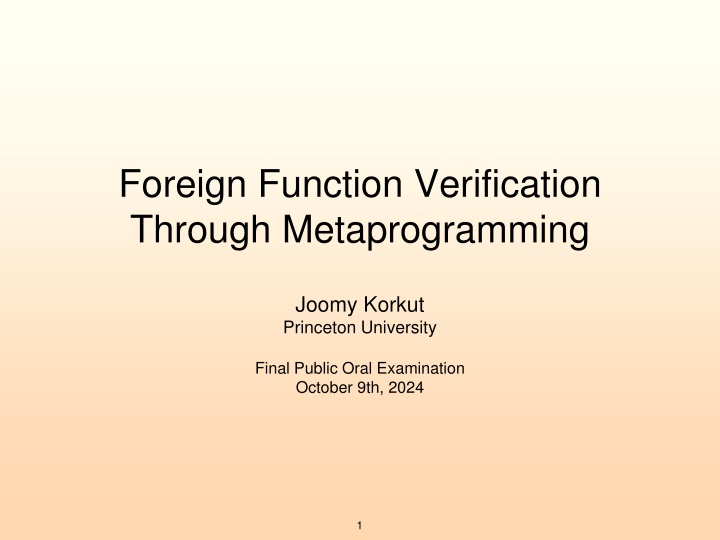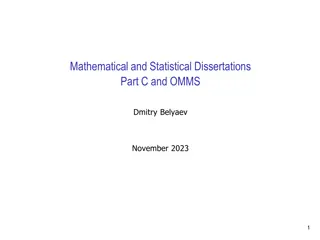
Foreign Function Verification Through Metaprogramming for Princeton University Final Examination
Explore the process of foreign function verification through metaprogramming in Joomy Korkut's final public oral examination at Princeton University. The examination covers topics such as certifying C programs, abstract type operations, Coq and C code integration, and functional modeling. Witness the integration of different programming languages for specialized functionalities.
Download Presentation

Please find below an Image/Link to download the presentation.
The content on the website is provided AS IS for your information and personal use only. It may not be sold, licensed, or shared on other websites without obtaining consent from the author. If you encounter any issues during the download, it is possible that the publisher has removed the file from their server.
You are allowed to download the files provided on this website for personal or commercial use, subject to the condition that they are used lawfully. All files are the property of their respective owners.
The content on the website is provided AS IS for your information and personal use only. It may not be sold, licensed, or shared on other websites without obtaining consent from the author.
E N D
Presentation Transcript
Foreign Function Verification Through Metaprogramming Joomy Korkut Princeton University Final Public Oral Examination October 9th, 2024 1
* 4
Wang et al. "Certifying Graph-Manipulating C Programs via Localizations within Data Structures" OOPSLA 2019 5
user's Coq code Module Type UInt63. Parameter uint63 : Type. Parameter from_nat : nat ->uint63. Parameter to_nat : uint63 -> nat. Parameter add mul: uint63 -> uint63 -> uint63. End UInt63. abstract type operations functional model Module FM : UInt63. Definition uint63 : Type := {n : nat | n < (2^63)}. Definition from_nat (n : nat) : uint63 := (Nat.modulo n (2^63); ...). Definition to_nat (i : uint63) : nat := let '(n; _) := i in n. Definition add (x y : uint63) : uint63 := let '(xn; x_pf) := x in let '(yn; y_pf) := y in ((xn + yn) mod (2^63); ...). (* ... *) End FM. Coq references to the foreign functions that will be realized on the C side Module C : UInt63. Axiom uint63 : Type. Axiom from_nat : nat -> uint63. Axiom to_nat : uint63 -> nat. Axiom add mul: uint63 -> uint63 -> uint63. End C. 6
user's Coq code user's C code value uint63_from_nat(value n){ // } value uint63_to_nat(struct thread_info *tinfo, value t){ // CertiCoqRegister [ C.from_nat=> "uint63_from_nat" , C.to_nat=> "uint63_to_nat" with tinfo , C.add=> "uint63_add , C.mul=> "uint63_mul" ] Include[ "prims.h" ]. } value uint63_add(value n, value m){ // } Definition dot_product (xsys: list C.uint63) : C.uint63 := List.fold_rightC.add (C.from_nat0) (zip_withC.mulxsys). valueuint63_mul(valuen, valuem) { // } CertiCoq Compile dot_product. CertiCoq Generate Glue [ nat, list ]. 7
user's Coq proof Definitionuint63_to_nat_spec : ident * funspec:= DECLARE_uint63_to_nat WITHgv: gvars, g : graph, roots : roots_t, sh: share, x : {_: FM.uint63 & unit}, p : rep_type, ti: val, outlier : outlier_t, t_info: thread_info PRE[ thread_info; int_or_ptr_type] PROP(writable_sharesh; @graph_predicateFM.uint63 g outlier (projT1 x) p) PARAMS(ti, rep_type_valg p) GLOBALS(gv) SEP(full_gcg t_inforoots outlier tishgv; mem_mgrgv) POST[ int_or_ptr_type] EX(p' : rep_type) (g' : graph) (roots': roots_t) (t_info': thread_info), PROP(@graph_predicatenatg' outlier ( FM.to_nat(projT1 x) ) p ; gc_graph_isog roots g' roots ; frame_shells_eq(ti_framest_info) (ti_framest_info )) RETURN(rep_type_valg' p ) SEP(full_gcg' t_info' roots' outlier tishgv; mem_mgrgv). Given some runtime info, and an input in the functional model, FM.uint63 if the C function takes a value that is represented by the functional model input, FM.uint63 then the C function returns a value that is represented by the functional model nat FM.to_nat(projT1 x) output. We claim that the function body satisfies this spec. Lemmabody_uint63_to_nat : semax_bodyVprogGprogf_uint63_to_nat uint63_to_nat_spec. Proof. ... Qed. ... 8
user's Coq proof function description Definitionto_nat_desc: fn_desc:= {| fn_type_reified:= ARGFM.uint63 opaque (fun_ => RESnattransparent) ; foreign_fn:= C.to_nat ; model_fn:= fun'(x; tt) => FM.to_natx ; fn_arity:= 1 ; c_name:= "int63_to_nat" |}. generate function specification Lemmabody_uint63_to_nat : semax_bodyVprogGprogf_uint63_to_nat (funspec_of_foreign@C.to_nat). Proof. ... Qed. 9
user's Coq proof generate function description MetaCoqRun (fn_desc_genFM.to_natC.to_nat"uint63_to_nat"). generate function specification Lemmabody_uint63_to_nat : semax_bodyVprogGprogf_uint63_to_nat (funspec_of_foreign@C.to_nat). Proof. ... Qed. 10
What is metaprogramming? inspection code generation 11
MetaCoq Gallina type and term inspection Gallina Gallina type and term generation 12
Ltac Gallina type, term, and proof state inspection Ltac Gallina proof term generation 13
monolithic vs distilled generation Problems 1. MetaCoq's representation of Coq terms is "low level" by design. Have to work with De Bruijn indices. Cannot have mutually recursive type class instances. Recursive calls have to refer to a specific fix expression. Type class inference has to resolve immediately. There is no easy inference based on a context. 2. Metaprograms are harder to reason about! VST specifications foreign types and functions code generation with metaprogramming 14
monolithic vs distilled generation graph predicates VST specifications foreign types and functions reified descriptions computation code generation with metaprogramming 15
parameter index an inductive data type in Coq Inductive vec (A : Type) : nat -> Type := | vnil : vec A O | vcons : forall n, A -> vec A n -> vec A (S n). argument result 16
MetaCoq description of vec {| cstr_name:= "vcons"; cstr_args:= [{| decl_name:= {| binder_name:= nAnon; binder_relevance:= Relevant |}; decl_body:= None; decl_type:= tApp(tRel3) [tRel2; tRel1] |}; {| decl_name:= {| binder_name:= nAnon; binder_relevance:= Relevant |}; decl_body:= None; decl_type:= tRel1 |}; {| decl_name:= {| binder_name:= nNamed"n"; binder_relevance:= Relevant |}; decl_body:= None; decl_type:= tInd{| inductive_mind:= (MPfile["Datatypes"; "Init"; "Coq"], "nat"); inductive_ind:= 0 |} [] |}]; cstr_indices:= [tApp (tConstruct {| inductive_mind:= (MPfile["Datatypes"; "Init"; "Coq"], "nat"); inductive_ind:= 0 |} 1 []) [tRel2]]; cstr_type:= tProd {| binder_name:= nNamed"A"; binder_relevance:= Relevant |} (tSort(sType(Universe.make' (Level.level"Top.3")))) (tProd {| binder_name:= nNamed"n"; binder_relevance:= Relevant |} (tInd {| inductive_mind:= (MPfile["Datatypes"; "Init"; "Coq"], "nat"); inductive_ind:= 0 |} []) (tProd {| binder_name:= nAnon; binder_relevance:= Relevant |} (tRel1) (tProd {| binder_name:= nAnon; binder_relevance:= Relevant |} (tApp(tRel3) [tRel2; tRel1]) (tApp(tRel4) [tRel3; tApp (tConstruct {| inductive_mind:= (MPfile["Datatypes"; "Init"; "Coq"], "nat"); inductive_ind:= 0 |} 1 []) [ tRel2]])))); cstr_arity:= 3 |}]; ind_projs:= []; ind_relevance:= Relevant |}]; ind_universes:= Monomorphic_ctx; ind_variance:= None |}); ]; retroknowledge:= ... |}, tInd{| inductive_mind:= (MPfile["Top"], "vec"); inductive_ind:= 0 |} []) ({| universes := (LevelSetProp.of_list[Level.level"Top.3"; Level.lzero], ConstraintSet.empty); declarations := [(MPfile["Top"], "vec", InductiveDecl {| ind_finite:= Finite; ind_npars:= 1; ind_params:= [{| decl_name:= {| binder_name:= nNamed"A"; binder_relevance:= Relevant |}; decl_body:= None; decl_type:= tSort(sType(Universe.make' (Level.level"Top.3"))) |}]; ind_bodies:= [{| ind_name:= "vec"; ind_indices:= [{| decl_name:= {| binder_name:= nAnon; binder_relevance:= Relevant |}; decl_body:= None; decl_type:= tInd{| inductive_mind:= (MPfile["Datatypes"; "Init"; "Coq"], "nat"); inductive_ind:= 0 |} [] |}]; ind_sort:= sType(Universe.from_kernel_repr(Level.lzero, 0) [(Level.level"Top.3", 0)]); ind_type:= tProd {| binder_name:= nNamed"A"; binder_relevance:= Relevant |} (tSort(sType(Universe.make' (Level.level"Top.3")))) (tProd {| binder_name:= nAnon; binder_relevance:= Relevant |} (tInd {| inductive_mind:= (MPfile["Datatypes"; "Init"; "Coq"], "nat"); inductive_ind:= 0 |} []) (tSort(sType(Universe.from_kernel_repr( Level.lzero, 0) [( Level.level"Top.3", 0)])))); ind_kelim:= IntoAny; ind_ctors:= [{| cstr_name:= "vnil"; cstr_args:= []; cstr_indices:= [tConstruct {| inductive_mind:= (MPfile["Datatypes"; "Init"; "Coq"], "nat"); inductive_ind:= 0 |} 0 []]; cstr_type:= tProd {| binder_name:= nNamed"A"; binder_relevance:= Relevant |} (tSort(sType(Universe.make' (Level.level"Top.3")))) (tApp(tRel1) [tRel0; tConstruct {| inductive_mind:= (MPfile["Datatypes"; "Init"; "Coq"], "nat"); inductive_ind:= 0 |} 0 []]); cstr_arity:= 0 |}; 17
VeriFFIs generation library higher-order abstract syntax-ish Inductivereified (ann: Type -> Type) : Type := | TYPEPARAM: (forall(A : Type) `(annA), reified ann) -> reified ann | ARG: forall(A : Type) `(annA), (A -> reified ann) -> reified ann | RES: forall(A : Type) `(annA), reified ann. (* vcons: forall(A : Type) (n : nat) (x : A) (xs: vecA n), vecA (S n) *) Definitionvcons_reified: reified InGraph:= TYPEPARAM(fun(A : Type) (InGraph_A: InGraphA) => ARGnatInGraph_nat(fun(n : nat) => ARGA InGraph_A(fun(x : A) => ARG(vecA n) (InGraph_vecA InGraph_An) (fun(xs: vecA n) => RES(vecA (S n)) (InGraph_vecA InGraph_A(S n)))))). annotations (* vlength: forall(A : Type) (n : nat) (xs: vecA n), nat*) Definitionvlength_reified: reified InGraph:= TYPEPARAM(fun(A : Type) (InGraph_A: InGraphA) => ARGnatInGraph_nat(fun(n : nat) => ARG(vecA n) (InGraph_vecA InGraph_An) (fun(xs: vecA n) => RESnatInGraph_nat))). For other mixes of deep and shallow embeddings, see: Outrageous But Meaningful Coincidences: Dependent Type-Safe Syntax and Evaluation . McBride. 2010. "Deeper Shallow Embeddings". Prinz, Kavvos, Lampropoulos. 2022. 18
What do reified descriptions buy us? 1. type safety user's Coq proof Definitionto_nat_desc: fn_desc:= {| fn_type_reified:= ARGFM.uint63 opaque (fun_ => RESnattransparent) ; foreign_fn:= C.to_nat ; model_fn:= fun'(x; tt) => FM.to_natx ; fn_arity:= 1 ; c_name:= "int63_to_nat" |}. 19
Compute (to_foreign_fn_typeto_nat_desc). Compute (reflect to_nat_desc). C.uint63 -> nat This is exactly the type of C.to_nat 20
Compute (to_foreign_fn_typeto_nat_desc). Compute (reflect to_nat_desc). {x : FM.uint63 & unit} -> nat This is the curried type of FM.to_nat 21
Compute (to_foreign_fn_typeto_nat_desc). Compute (to_model_fn_typeto_nat_desc). FM.uint63 -> nat This is exactly the type of FM.to_nat 22
2. rewrites of primitives to models proofs about our Coq program Lemma add_assoc : forall (x y z : nat), C.to_nat (C.add (C.from_nat x) (C.add (C.from_nat y) (C.from_nat z))) = C.to_nat (C.add (C.add (C.from_nat x) (C.from_nat y)) (C.from_nat z)). Proof. 23
2. rewrites of primitives to models proofs about our Coq program Lemma add_assoc : forall (x y z : nat), C.to_nat (C.add (C.from_nat x) (C.add (C.from_nat y) (C.from_nat z))) = C.to_nat (C.add (C.add (C.from_nat x) (C.from_nat y)) (C.from_nat z)). Proof. unfold C.to_nat. Error: C.to_natis opaque. 24
2. rewrites of primitives to models proofs about our Coq program Lemma add_assoc : forall (x y z : nat), C.to_nat (C.add (C.from_nat x) (C.add (C.from_nat y) (C.from_nat z))) = C.to_nat (C.add (C.add (C.from_nat x) (C.from_nat y)) (C.from_nat z)). Proof. intros x y z. props from_nat_spec. props to_nat_spec. props add_spec. prim_rewrites. 1 goal x, y, z : nat ============================ FM.to_nat (FM.add (FM.from_nat x) (FM.add (FM.from_nat y) (FM.from_nat z))) = FM.to_nat (FM.add (FM.add (FM.from_nat x) (FM.from_nat y)) (FM.from_nat z)) 25
Eval cbn in model_spec to_nat_spec. Eval cbn in model_spec add_spec. forall(x : C.uint63), C.to_natx = FM.to_nat(from x) : Prop 26
Evalcbninmodel_specto_nat_spec. Evalcbninmodel_specadd_spec. forall(x y : C.uint63), C.addx y = to (FM.add(from x) (from y)) : Prop 27
An isomorphism between the foreign type and the model type generated function description Definitionto_nat_desc: fn_desc:= {| fn_type_reified:= ARGFM.uint63 opaque (fun_ => RESnattransparent) ; foreign_fn:= C.to_nat ; model_fn:= fun'(x; tt) => FM.to_natx ; fn_arity:= 1 ; c_name:= "int63_to_nat" |}. 28
An isomorphism between the foreign type and the model type generated function description HypothesisIsomorphism_uint63 : Isomorphism C.uint63 FM.uint63. Definitionto_nat_desc: fn_desc:= {| fn_type_reified:= ARGFM.uint63 (@opaque FM.uint63 C.uint63 _ Isomorphism_uint63)(fun_ => RESnattransparent) ; foreign_fn:= C.to_nat ; model_fn:= fun'(x; tt) => FM.to_natx ; fn_arity:= 1 ; c_name:= "int63_to_nat" |}. 29
Comparison with other verified compilers / FFIs Cogent (2016-2022) CakeML (2014-2019) Melocoton (2023) VeriFFI (2017-2024) uf (2018) certifying compiler + verifiable FFI verified compiler verified compiler + FFI verified compiler + verifiable FFI project verifiable FFI language pair subset of Coq and C Cogent and C toy subset of OCaml and toy subset of C Coq and CompCert C ML and C correctness + safety correctness + safety correctness + safety FFI aims for - safety not a program logic but an oracle about FFIs Iris s separation logic for multi-language semantics VST s mechanism - - separation logic has a garbage collection optional external GC no yes yes nondeterministic model (unnecessary) (verified) (verified) 30
The important scientific contributions of my dissertation are Reified descriptions can describe and annotate function types in a concise and type-safe way. Given a reified description, we can calculate separation logic specifications about foreign functions that talk about their correctness and safety. We can assume an isomorphism between the foreign type and the model type if there s a module equivalence. See my dissertation for Details of glue code, reified descriptions, function descriptions, constructor descriptions, rewrite principles, and their generation Examples, such as primitive bytestrings, I/O and mutable arrays 31






















